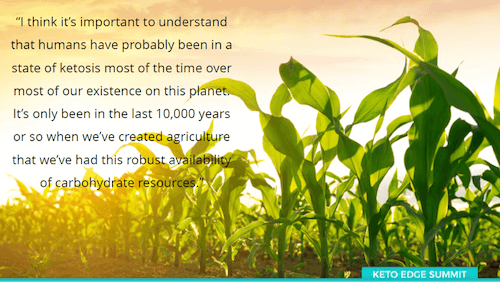
We know that ketones help you burn fat for energy, powerfully reduce inflammation and show promise in preventing and eradicating diabetes, cancer, autoimmune and neurodegenerative diseases like Alzheimer’s and Parkinson’s, and even play a role in mental health conditions like anxiety and depression. Experts on the Keto Edge Summit share many of the brain and mood benefits of a ketogenic lifestyle.
Dr. David Jockers shares this about anxiety and GABA and glutamate (his #5 benefit) in his interview on the ‘Top 7 Benefits of a Ketogenic Lifestyle’:
We have an epidemic of depression and anxiety in our society. And so, one of the key things that being keto-adapted does—not only does it downregulate inflammation in the brain, and we know that depression now is really neuroinflammation.
So the other big thing is we’ve got these neurotransmitters. One is glutamate; the other is GABA. Glutamate is an excitatory neurotransmitter, meaning that it helps us think sharply and quickly. What balances glutamate is this other neurotransmitter called GABA, gamma-aminobutyric acid. And it’s inhibitory. It helps balance us and calm us. What we find is that people with anxiety, they have high glutamate, low GABA. They don’t have a good ratio. Same thing with depression.
So what a ketogenic diet does, when we’re keto-adapted, it helps balance out the glutamate to GABA ratio and creates stability there. What does that mean to you? That means you’re going to be able to think sharply and quickly but you’re not going to get out of control. Your brain’s not going to be going too fast. You’re not going to be at risk for anxiety, for depression in the same way. You’re going to notice just an improved mood, more emotional balance.
Dr. David Perlmutter shares the importance of blood sugar regulation in his interview ‘Keto for Brain Health’:
Blood sugar regulation is pivotal as it relates to the destiny of your brain. Probably the most important biometric that determines whether you will or won’t become an Alzheimer’s patient is what your fasting blood sugar is today.
Even with the ApoE-4 gene, the ketogenic diet, physical exercise, and gluten-free, lowering sugar and carbs… are important changes that can absolutely rewrite your book.
I think it’s important to understand that humans have probably been in a state of ketosis most of the time over most of our existence on this planet. It’s only been in the last 10,000 years or so when we’ve created agriculture that we’ve had this robust availability of carbohydrate resources that has really shifted the human diet to one that is carbohydrate-based as opposed to fat-based.
Dr. Cheryl Burdette also covers inflammation in her interview, ‘Inflammation and the Ketogenic Diet’:
So when we see markers of oxidative stress high, not only do we know the DNA is suffering but we know our mitochondria, our powerhouse is suffering and, therefore, our brain is suffering. And so what you see is a high 8-OHdG – you see that high in conditions like Alzheimer’s or Parkinson’s but you even see it high in depression or bipolar or anxiety. What you also see is a ketogenic diet, helps to lower that. What you also see is adding more antioxidants, helps to lower that. So again, we’re back to our green leafies with our good fats.
The Keto Edge Summit is available online and there are REPLAYS ALL WEEKEND. You can still register here to hear the replays
Please share your gems and what you’ve implemented or are planning to implement in terms of a ketogenic lifestyle.
Hello,
My husband and myself have been following the keto diet for over 3 months now and… most would be pleased with the weight we have lost, we are not as this is not the reason we are following the diet. I lost 7kg and my husband lost over 5kg. I weighed 53.5k and now 47.5k and am skinny and have no more muscle mass… Same for my husband. And, we have no energy. Could we be doing something wrong?
And thank you for this summit. I bought the transcripts but haven’t had the time to read all of them yet… We are in our seventies. We wanted more energy and a better brain!!
Thanks again.
Evelyne
Evelyne
I’m just going thru all the transcripts myself and am hoping this subject of too much weight-loss will be covered. In Dr. David Jockers interview he shares this “branch chain amino acids – leucine, isoleucine, valine can be really effective for preserving lean body tissue and just really giving you more energy, drive, helping you with tissue recovery” but I don’t know the specifics which is why I’ve joined his keto group program so I can learn more.
For the low energy issue I’d wonder if adrenal dysfunction may be a factor. Dr. Will Cole discusses adrenal health and says to “eat more frequently initially, add 2 t salt daily, magnesium, broths and adaptogenic herbs.
There is also good info in Leanne Vogel’s interview on how women should be doing keto differently. Dr. Anna Cabeca covers keto for menopausal women.
I’d love to hear what a typical day looks like for each of you – meals, supps and timing?
May husband started the ketogenic diet today. He would like to lose about 30 pounds, teeters on the edge of depression at the best of times, has intense sugar cravings and is probably addicted to carbohydrates. He is feeling very discouraged because his mood is already crashing (about 4/10). Is there anything that would help?
Janine
I have clients use the amino acids to help with sugar cravings, carb addictions and mood issues. They help many folks making the keto transition easier. A word of caution about keto – making sure it’s done well is key to prevent crashing